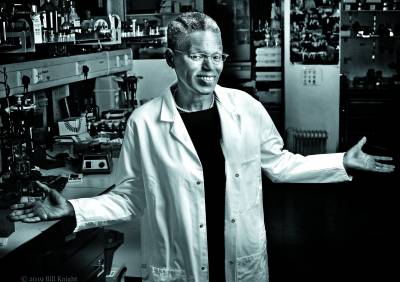Ijeoma Uchegbu elected Fellow of the Academy of Medical Sciences
8 June 2021
The Academy of Medical Sciences recently elected 50 prominent biomedical and health scientists to its Fellowship, one of whom was Professor Ijeoma Uchegbu.
The new Fellows were selected for their exceptional contributions to the advancement of medical science through innovative research discoveries and translating scientific developments into benefits for patients and the wider society.
Pharmaceutical nanoscientist Professor Ijeoma Uchegbu FMedSci, at the UCL School of Pharmacy, has deployed nanotechnology to enable therapeutically effective doses of drugs to reach their targets in the brain, having profound implications for cancer and neurological conditions.
Professor Uchegbu said "I am really honoured to have been elected Fellow of the Academy of Medical Sciences and feel very pleased that our research has been recognised."
Photo by Bill Knight for the exhibition Phenomenal Women: Portraits of Black Female Professors.

Ijeoma Uchegbu is a Professor of Pharmaceutical Nanoscience. She has studied the mechanisms of drug transport across biological barriers and created transformational drug transport nanoparticles. She was the first to show that peptides could be delivered across the blood brain barrier to elicit a pharmacological response, when presented as peptide drug nanofibers and the first to demonstrate, via definitive pharmacology and pharmacokinetics evidence, peptide transport into the brain, using peptide nanoparticles delivered via the nose to brain route.
These findings led to the enkephalin pain medicine candidate (NES100), designed to address the opioid crisis. In preclinical studies, NES100 showed no analgesic tolerance, reward seeking behaviour or potential to cause significant constipation. NES100 has been out licensed to Virpax Pharmaceuticals and is currently being developed by the US National Center for Advancing Translational Studies. If successful, this will be the first neuropeptide medicine approval and it will have been made possible by the innovation originating in Uchegbu’s group.
The technology underpinning NES100 won first prize in the Royal Society of Chemistry’s Emerging Technologies competition in 2017 and the Academy of Pharmaceutical Sciences Science Innovation Award in 2016. Three other medicine candidates based on this nanotechnology have been out-licensed to pharmaceutical companies in the US. Uchegbu’s work has been funded continuously for 21 years by the EPSRC.
As UCL’s Pro Vice Provost for Africa and the Middle East, Professor Uchegbu leads on the international research and teaching engagement strategy in this region. She has served as Chair of the Academy of Pharmaceutical Sciences and chaired EPSRC and Science Foundation Ireland grant prioritisation panels. She is UCL Provost’s Envoy for Race Equality and leads on race equality work at UCL. Her initiatives (e.g. Dean’s Pledges on Race Equality) were instrumental in achieving UCL’s Bronze Race Charter in 2020.
Further information:
- Professor Ijeoma Uchegbu Staff Profile
- Phenomenal Women: Portraits of Black Female Professors
- Academy of Medical Sciences article about this appointment
- UCL Race Equality
- UCL Africa and Middle East Network
 Close
Close

